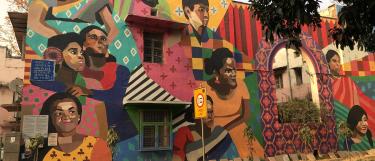
Visual and Media Anthropology
Images and media have been central to transcultural encounters and entanglements for a long time. In today’s globalizing world, governments, institutions, and other actors draw on images and different media in order to articulate aspirations, legitimize their interests, or shape public opinions. Within this representative and dynamic process, images transform their meaning and significance as they journey through various media technologies and across social, political, and geographical boundaries or subjective positionalities, in turn transforming these contexts. At the department of Visual and Media Anthropology, we apply a critical ethnographic lens to the asymmetrical flows in and through which visual cultures, practices, and artefacts are produced and distributed. Such an analysis also allows for a deeper understanding of the way cultural, religious, and political communities and publics are formed and transformed as a result of different image itineraries and media circulations as well as dimensions of placemaking. The department aspires to provide a solid body of theoretical and methodological tools to grapple with the challenges of transculturation in and through visual and media cultures and histories.
Announcements and News
Research
Research at the department of Visual and Media Anthropology critically engages with the dynamic role of images and diverse media in global and transcultural contexts. Our key research areas include cultural and social practices within contemporary art production, archiving, and curation, the politics of heritage-making (e.g., heritage activism and repatriation), mobilities and urban transformation, (e.g., urban design and migration in cities of the “Global South”) as well as gender and religion. Our geographical foci range from South and Southeast Asia to Western Europe and Australia. In terms of methodology, we engage in visual and media ethnography, critical practices of archiving and documenting, multimodal and interdisciplinary approaches to knowledge production, and collaborative anthropology.
Studies
Research-based teaching takes central stage at the department. Students are encouraged not only to become familiar with the ongoing research of the teaching staff, but also to practice academic skills and methods themselves through carrying out research projects according to their own interests. We invite students to engage with multi-media knowledge production in different contexts, such as the organisation of a queer film festival, the in/visibility of diversity and difference in a city like Heidelberg, and ongoing debates about the restructuring of ethnographic museums. We offer seminars on a wide range of topics, including social media and politics in Asia, heritage, solidarity, and activism in globalizing cities, protest movements, gender in a transcultural context, and feminist anthropology. Our teaching staff often cooperate with colleagues from other disciplines at Heidelberg University as well as with international organisations and institutions. The department is also closely connected to the Master programmes in South Asian Studies (South Asia Institute), Cultural and Social Anthropology (Institute of Anthropology), and Heritage Studies (Heidelberg Centre for Cultural Heritage).








